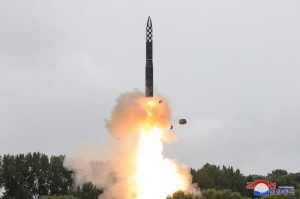North Korea launched an intercontinental ballistic missile (ICBM) on Thursday, according to the South Korean military. The missile was launched from Pyongyang, a capital of North Korea, at 7:11 a.m. (KST) and fell into waters outside Japan’s exclusive economic zone at around 8:37 a.m.
It is the North’s first ICBM test since its test launch of the Hwasong-18 ICBM on December 18, 2023. More details of the missile’s performance will likely be shared by the North’s state media in the coming days.
Hours after the launch, North Korean leader Kim Jong Un vowed to continue developing his ballistic missile programs and blamed the United States and South Korea for escalating tensions on the Korean Peninsula.
“The test-fire is an appropriate military action that fully meets the purpose of informing the rivals, who have intentionally escalated the regional situation and posed a threat to the security of our Republic recently, of our counteraction will,” Kim was quoted by saying in a report of the North’s state media Korean Central News Agency. The test “also constitutes an indispensable process in the course of constantly developing our state’s strategic attack forces,” he added.
“The security situation of our state and ever-aggravating prospective threats and challenges require us to continue to bolster up our modern strategic attack forces and more perfectly round off our nuclear forces’ response posture,” Kim said. “I affirm the DPRK will never change its line of bolstering up its nuclear forces.” (DPRK is an acronym of the North’s official name: Democratic People’s Republic of Korea.)
The United States and South Korea immediately condemned the North’s ICBM launch.
“While U.S. INDOPACOM has assessed it did not pose an immediate threat to U.S. personnel, or territory, or to our allies, this launch needlessly raises tensions and risks destabilizing the security situation in the region,” Sean Savett, a spokesperson of White House National Security Council, said in a statement. Condemning the North’s ICBM test as a violation of “multiple U.N. Security Council resolutions,” he also said that “it only demonstrates that the DPRK continues to prioritize its unlawful weapons of mass destruction and ballistic missile programs over the well-being of its people.”
South Korean President Yoon Suk-yeol also vowed to take necessary measures against the North’s ICBM launch.
The launch was carried out just after the 56th Security Consultative Meeting (SCM) was held in Washington. During the meeting, South Korean Defense Minister Kim Yong-hyun and U.S. Secretary of Defense Lloyd Austin “condemned the DPRK’s multiple missile launches, including ballistic missiles, its attempted launches of a space launch vehicle, and Russian-DPRK arms trade as clear violations of existing U.N. Security Council resolutions.” On Thursday, the U.S. secretaries of defense and state and the South Korean ministers of defense and foreign affairs will hold a meeting in Washington.
At the time of the ICBM test, North Korean’s foreign minister was in Moscow for “strategic consultations” with her Russian counterparts. As the North Korea-Russia military cooperation has been significantly strengthened in recent months, Pyongyang will not hesitate to make more provocations against Washington and Seoul.
Indeed, North Korea’s Thursday ICBM test was anticipated through intelligence. Still, Pyongyang is unlikely to carry out a nuclear test ahead of the U.S. presidential election scheduled on November 5.
Last year alone, North Korea conducted five ICBM tests, launching the Hwasong-15 in February, the Hwasong-17 in March, and the Hwasong-18 in both April and July.
































